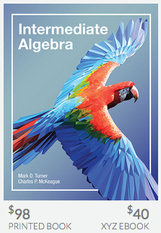 A recent survey indicates that 92% of all college students prefer a print textbook to a digital one. And we know that this is especially true in college level, developmental mathematics. Those of us who teach developmental math know that some of our students do not have adequate internet access at home. The students in rural areas sometime have no internet access. The same is true for some of our low-income students. The advantage to a print textbook is that you can study anywhere. Probably the best solution right now is to have both a print book and an eBook. If you ask the major publishers, they will tell you that students prefer buying an eBook over a print book, and that the difference is increasing every year. Of course that's true; the publishers are the ones the priced their print books out of reach of students. They created the problem and now they are telling us the eBook is the solution. They are also telling us that students perform better in their courses if they use digital materials. But many of these studies come from the publishers themselves. And some of them don't look like actual studies at all. We have to ask ourselves if students do better in an all digital course, using a program like MyMathLab, or are they better off in a course with an instructor, a textbook, and digital ancillaries. My experience is that they are better off in a class with an instructor and a textbook. They may perform better in the all digital course, by getting a higher grade than they would otherwise, but have they really learned more? Can they solve problems and show their work on paper? Studies that are done from more objective organizations have findings counter to what the publishers are touting. When the Bill and Melinda Gates Foundation announced they were doing a study on the effectiveness of adaptive learning, McGraw-Hill posted an article on their website indicating they were very excited about the study. They were sure their adaptive learning systems would prevail over other systems. They even quoted the Gates Foundation blog:
But things didn't turn our as well as they had hoped they would. As reported in Inside Higher Education, the results of the study were inconclusive; there does not seem to be a definitive advantage for adaptive learning over other online learning systems.
I think we need to be careful about how we use the information we receive from publishers about the effectiveness of their products. Common sense, and experience in the classroom, tell us some of the claims are just not true. At XYZ Textbooks, our print books for individual courses range in price from $48 to $120, and each new copy comes with access to all of our eBooks and videos for a whole year. If a students want just the eBook access, that will cost them $45. Our sales ratios show less than 25% of the students buying one of our products, buys the eBook only. Our online homework systems works very well and is free with the purchase of a new print book, or with the purchase of an All Access Pass. Before you believe that students prefer an eBook, or that an online homework system is going to solve your problems in the classroom, come to our website and see what we have to offer. You will not be disappointed. |
Postings
All the posts you see here have been, or will be, posted on my LinkedIn account. If you want to see them as they are released, follow me on LinkedIn: Archives
August 2020
|
 RSS Feed
RSS Feed